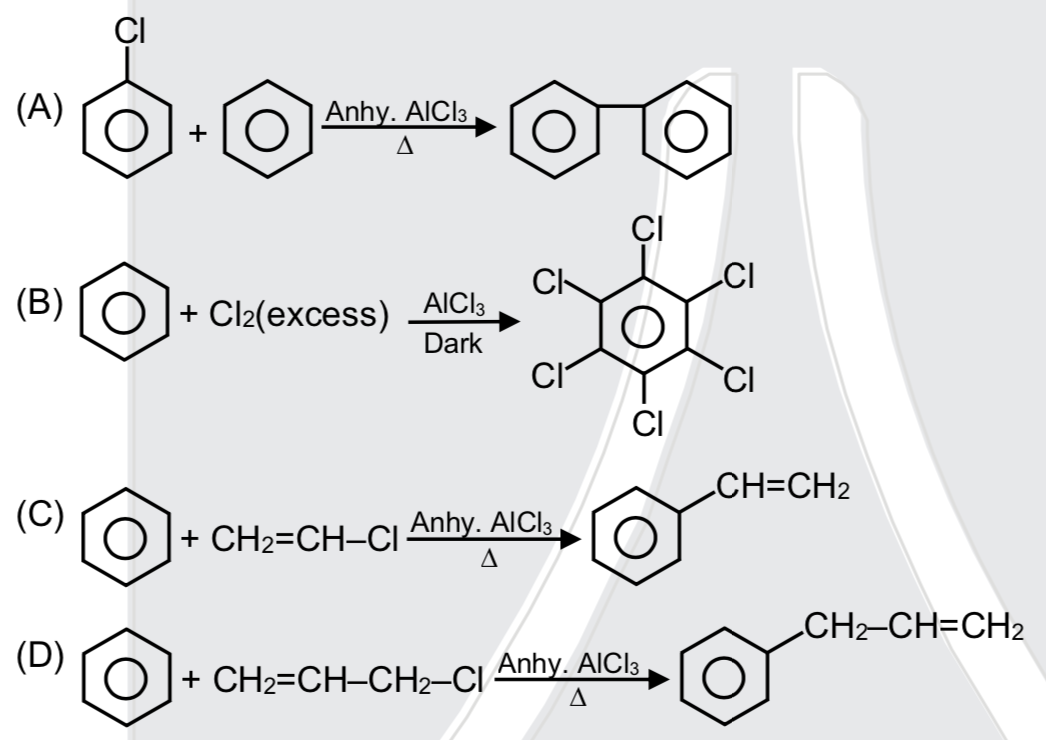Which of the following is not possible directly in nitrobenzene?
Halogenation
Sulphonation
Nitration
Alkylation
To solve the question "Which of the following is not possible directly in nitrobenzene?", we need to analyze the effects of the nitro group (-NO2) on the reactivity of the benzene ring. Here’s a step-by-step solution:
Step 1: Understand the Nature of the Nitro Group
The nitro group (-NO2) is a strong electron-withdrawing group. It pulls electron density away from the benzene ring through resonance and inductive effects. This significantly affects the reactivity of the benzene ring towards electrophilic substitution reactions.
Hint: Remember that electron-withdrawing groups decrease electron density on the aromatic ring, making it less reactive towards electrophiles.
Step 2: Identify the Positions of Electrophilic Attack
In a benzene ring, electrophilic substitution can occur at three positions: ortho, meta, and para. The presence of the nitro group directs incoming electrophiles to the meta position because the ortho and para positions are less favorable due to the decreased electron density caused by the nitro group.
Hint: Consider how the electron density changes at different positions of the benzene ring when an electron-withdrawing group is present.
Step 3: Analyze Friedel-Crafts Alkylation
Friedel-Crafts alkylation involves the generation of a carbocation (R+) from an alkyl halide (RCl) using a Lewis acid (like FeCl3). The carbocation is an electrophile that attacks the benzene ring. However, for this reaction to proceed efficiently, the benzene ring needs to be electron-rich, which is not the case with nitrobenzene.
Hint: Recall that Friedel-Crafts reactions require a reactive aromatic system, which is not the case when an electron-withdrawing group is present.
Step 4: Conclude the Reactivity of Nitrobenzene
Due to the strong electron-withdrawing nature of the nitro group, nitrobenzene is not reactive enough to undergo Friedel-Crafts alkylation. Therefore, the reaction cannot occur directly in nitrobenzene.
Hint: Think about the overall reactivity of the aromatic compound and how substituents influence that reactivity.
Final Answer
The process that is not possible directly in nitrobenzene is Friedel-Crafts alkylation.
The nitro group (-NO2) is a strong electron-withdrawing group. It pulls electron density away from the benzene ring through resonance and inductive effects. This significantly affects the reactivity of the benzene ring towards electrophilic substitution reactions.
In a benzene ring, electrophilic substitution can occur at three positions: ortho, meta, and para. The presence of the nitro group directs incoming electrophiles to the meta position because the ortho and para positions are less favorable due to the decreased electron density caused by the nitro group.
Friedel-Crafts alkylation involves the generation of a carbocation (R+) from an alkyl halide (RCl) using a Lewis acid (like FeCl3). The carbocation is an electrophile that attacks the benzene ring. However, for this reaction to proceed efficiently, the benzene ring needs to be electron-rich, which is not the case with nitrobenzene.
Due to the strong electron-withdrawing nature of the nitro group, nitrobenzene is not reactive enough to undergo Friedel-Crafts alkylation. Therefore, the reaction cannot occur directly in nitrobenzene.
The process that is not possible directly in nitrobenzene is Friedel-Crafts alkylation.
Similar Questions
Knowledge Check
Which of the following reaction is possible ?
AC6H5OH+HBr→C6H5Br+H2OB(CH3)3CCl+NaOCH3→(CH3)3COCH3+NaClC D
D
Which of the following reaction is possible ?
AC6H5OH+HBr→C6H5Br+H2OB(CH3)3CCl+NaOCH3→(CH3)3COCH3+NaClC D
D
Which of the following reaction is possible ?
AC6H5OH+HBr→C6H5Br+H2OB(CH3)3CCl+NaOCH3→(CH3)3COCH3+NaClC D
D
Which of the following reaction is possible ?
View SolutionWhich of the following reactions are possible ?

View SolutionWhich of the following reactions are possible ?

View SolutionWhich of the following is not possible in sexual reproduction?
View SolutionWhich of the following give aniline by reduction of nitrobenzene?
View Solution
